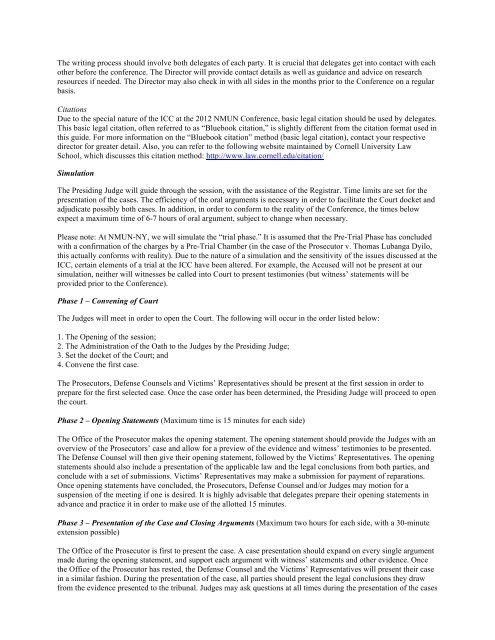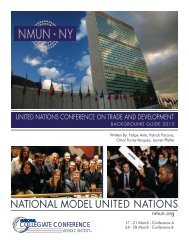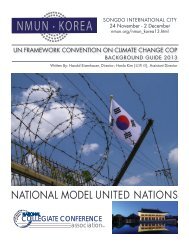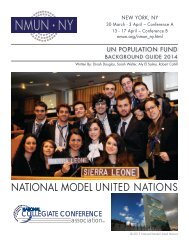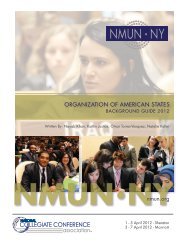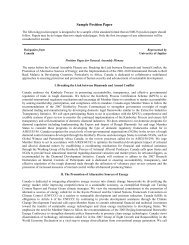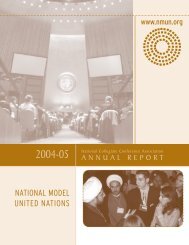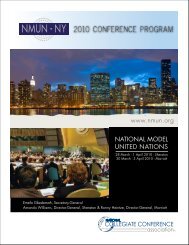International Criminal Court (ICC) - National Model United Nations
International Criminal Court (ICC) - National Model United Nations
International Criminal Court (ICC) - National Model United Nations
Create successful ePaper yourself
Turn your PDF publications into a flip-book with our unique Google optimized e-Paper software.
The writing process should involve both delegates of each party. It is crucial that delegates get into contact with each<br />
other before the conference. The Director will provide contact details as well as guidance and advice on research<br />
resources if needed. The Director may also check in with all sides in the months prior to the Conference on a regular<br />
basis.<br />
Citations<br />
Due to the special nature of the <strong>ICC</strong> at the 2012 NMUN Conference, basic legal citation should be used by delegates.<br />
This basic legal citation, often referred to as “Bluebook citation,” is slightly different from the citation format used in<br />
this guide. For more information on the “Bluebook citation” method (basic legal citation), contact your respective<br />
director for greater detail. Also, you can refer to the following website maintained by Cornell University Law<br />
School, which discusses this citation method: http://www.law.cornell.edu/citation/<br />
Simulation<br />
The Presiding Judge will guide through the session, with the assistance of the Registrar. Time limits are set for the<br />
presentation of the cases. The efficiency of the oral arguments is necessary in order to facilitate the <strong>Court</strong> docket and<br />
adjudicate possibly both cases. In addition, in order to conform to the reality of the Conference, the times below<br />
expect a maximum time of 6-7 hours of oral argument, subject to change when necessary.<br />
Please note: At NMUN-NY, we will simulate the “trial phase.” It is assumed that the Pre-Trial Phase has concluded<br />
with a confirmation of the charges by a Pre-Trial Chamber (in the case of the Prosecutor v. Thomas Lubanga Dyilo,<br />
this actually conforms with reality). Due to the nature of a simulation and the sensitivity of the issues discussed at the<br />
<strong>ICC</strong>, certain elements of a trial at the <strong>ICC</strong> have been altered. For example, the Accused will not be present at our<br />
simulation, neither will witnesses be called into <strong>Court</strong> to present testimonies (but witness’ statements will be<br />
provided prior to the Conference).<br />
Phase 1 – Convening of <strong>Court</strong><br />
The Judges will meet in order to open the <strong>Court</strong>. The following will occur in the order listed below:<br />
1. The Opening of the session;<br />
2. The Administration of the Oath to the Judges by the Presiding Judge;<br />
3. Set the docket of the <strong>Court</strong>; and<br />
4. Convene the first case.<br />
The Prosecutors, Defense Counsels and Victims’ Representatives should be present at the first session in order to<br />
prepare for the first selected case. Once the case order has been determined, the Presiding Judge will proceed to open<br />
the court.<br />
Phase 2 – Opening Statements (Maximum time is 15 minutes for each side)<br />
The Office of the Prosecutor makes the opening statement. The opening statement should provide the Judges with an<br />
overview of the Prosecutors’ case and allow for a preview of the evidence and witness’ testimonies to be presented.<br />
The Defense Counsel will then give their opening statement, followed by the Victims’ Representatives. The opening<br />
statements should also include a presentation of the applicable law and the legal conclusions from both parties, and<br />
conclude with a set of submissions. Victims’ Representatives may make a submission for payment of reparations.<br />
Once opening statements have concluded, the Prosecutors, Defense Counsel and/or Judges may motion for a<br />
suspension of the meeting if one is desired. It is highly advisable that delegates prepare their opening statements in<br />
advance and practice it in order to make use of the allotted 15 minutes.<br />
!<br />
Phase 3 – Presentation of the Case and Closing Arguments (Maximum two hours for each side, with a 30-minute<br />
extension possible)<br />
The Office of the Prosecutor is first to present the case. A case presentation should expand on every single argument<br />
made during the opening statement, and support each argument with witness’ statements and other evidence. Once<br />
the Office of the Prosecutor has rested, the Defense Counsel and the Victims’ Representatives will present their case<br />
in a similar fashion. During the presentation of the case, all parties should present the legal conclusions they draw<br />
from the evidence presented to the tribunal. Judges may ask questions at all times during the presentation of the cases


